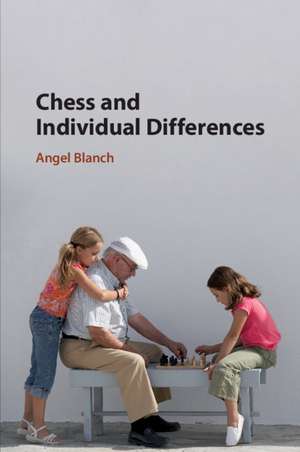Chess and Individual Differences
Autor Angel Blanchen Limba Engleză Paperback – 14 dec 2022
| Toate formatele și edițiile | Preț | Express |
|---|---|---|
| Paperback (1) | 268.51 lei 43-57 zile | |
| Cambridge University Press – 14 dec 2022 | 268.51 lei 43-57 zile | |
| Hardback (1) | 727.07 lei 43-57 zile | |
| Cambridge University Press – 16 dec 2020 | 727.07 lei 43-57 zile |
Preț: 268.51 lei
Nou
Puncte Express: 403
Preț estimativ în valută:
51.38€ • 53.79$ • 42.51£
51.38€ • 53.79$ • 42.51£
Carte tipărită la comandă
Livrare economică 07-21 aprilie
Preluare comenzi: 021 569.72.76
Specificații
ISBN-13: 9781108469456
ISBN-10: 1108469450
Pagini: 310
Dimensiuni: 228 x 151 x 21 mm
Greutate: 0.42 kg
Editura: Cambridge University Press
Colecția Cambridge University Press
Locul publicării:Cambridge, United Kingdom
ISBN-10: 1108469450
Pagini: 310
Dimensiuni: 228 x 151 x 21 mm
Greutate: 0.42 kg
Editura: Cambridge University Press
Colecția Cambridge University Press
Locul publicării:Cambridge, United Kingdom
Cuprins
1. Introduction; 2. Quantifying chess skill; 3. Cognition; 4. Individual differences; 5. Psychophysiology and brain functioning; 6. Intelligence; 7. Personality; 8. Expertise; 9. Sex difference; 10. Applications; 11. Concluding remarks.
Recenzii
'This fascinating book explores, from a sound scientific perspective, the relationships between chess and a broad variety of psychological, biological and social factors, evoking widely acknowledged individual differences. Angel Blanch did a superb job addressing the mysterious blend that amazes many of us.' Roberto Colom, Professor of Individual Differences, Autonomous University of Madrid, Spain
'Chess has long been the canonical sandbox for the study of expertise development, intelligence, brain functioning and personality. This remarkable monograph provides an excellent synthesis of scholarly work in these areas, and highlights the key findings in social science research derived through the study of chess competition and its players.' Mark Glickman, Senior Lecturer on Statistics, Harvard University, USA
'Angel Blanch provides an in-depth discussion of chess psychology, focusing on intelligence and personality, but also covering topical issues such as brain functioning and sex differences. The analyses raise important questions that will inspire future research. This book is an essential reference work for anyone interested in individual differences in chess.' Fernand Gobet, Professorial Research Fellow, London School of Economics and Political Science, UK
'This book is essential reading for those interested in the psychological research on chess. It provides an excellent summary of the evidence about the factors that can explain individual differences in the game and integrates this knowledge into a coherent theoretical framework. In this way, it can inspire researchers and chess players themselves.' Roland H. Grabner, Professor of Psychology, University of Graz, Austria
'Chess has long been the canonical sandbox for the study of expertise development, intelligence, brain functioning and personality. This remarkable monograph provides an excellent synthesis of scholarly work in these areas, and highlights the key findings in social science research derived through the study of chess competition and its players.' Mark Glickman, Senior Lecturer on Statistics, Harvard University, USA
'Angel Blanch provides an in-depth discussion of chess psychology, focusing on intelligence and personality, but also covering topical issues such as brain functioning and sex differences. The analyses raise important questions that will inspire future research. This book is an essential reference work for anyone interested in individual differences in chess.' Fernand Gobet, Professorial Research Fellow, London School of Economics and Political Science, UK
'This book is essential reading for those interested in the psychological research on chess. It provides an excellent summary of the evidence about the factors that can explain individual differences in the game and integrates this knowledge into a coherent theoretical framework. In this way, it can inspire researchers and chess players themselves.' Roland H. Grabner, Professor of Psychology, University of Graz, Austria
Notă biografică
Descriere
This book adopts an individual differences approach to explain the psychology of chess by reviewing an extensive body of research.
